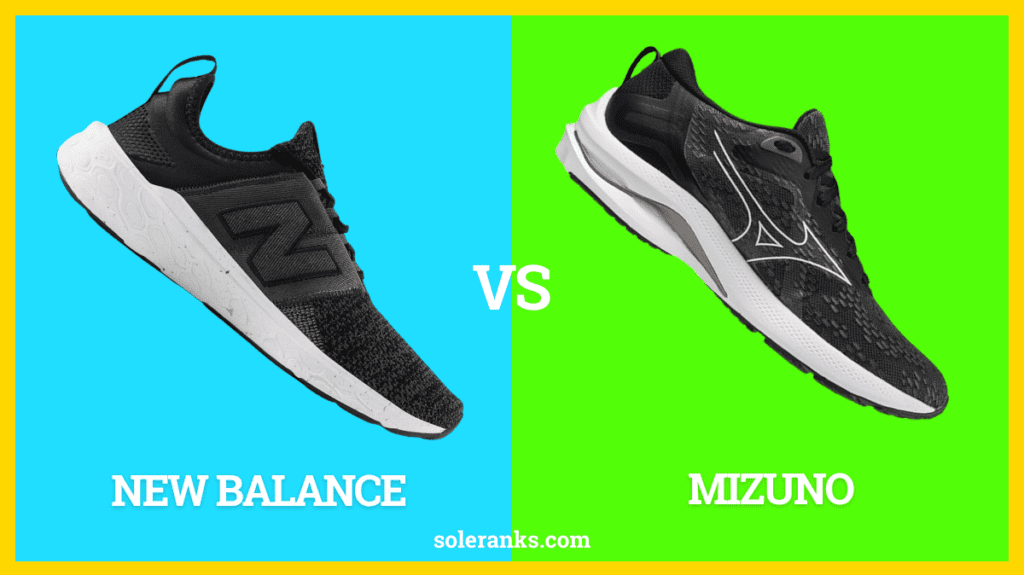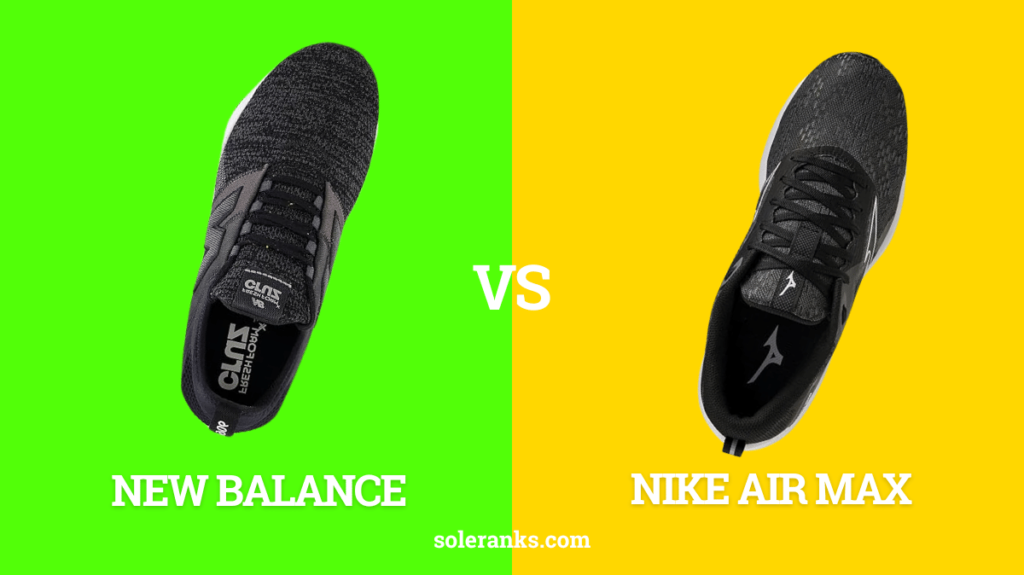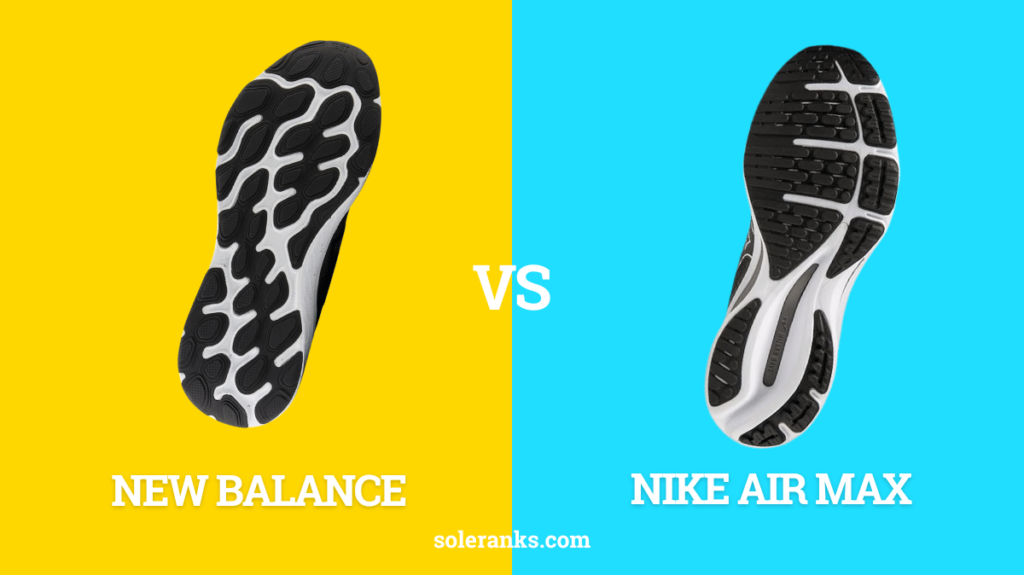New Balance shoes typically provide better all-day comfort with their cushioned soles and wider fit options, while Mizuno excels in responsiveness with their Wave plate technology that delivers superior energy return for serious runners.
Durability-wise, New Balance constructs shoes with sturdy materials that handle daily wear effectively, whereas Mizuno focuses on lightweight performance that may sacrifice some longevity.
Price points differ notably New Balance offers options across budget ranges ($70-200+), while Mizuno primarily targets the mid-to-premium market ($100-180).
Stylistically, New Balance has embraced the retro-athletic aesthetic that works well for both exercise and casual wear, while Mizuno maintains a technical, performance-focused design language.
For everyday comfort and style versatility, New Balance has the edge for responsive performance and precision fit in running, Mizuno takes the lead.

Contents
- 1 New Balance vs Mizuno Shoes
- 2 Brand Backgrounds
- 3 Comfort Comparison
- 4 Cushioning
- 5 Shoe Fit
- 6 Durability
- 7 Material Quality
- 8 Breathability
- 9 Weight
- 10 Stability
- 11 Flexibility
- 12 Water Resistance
- 13 Sole Construction
- 14 Style Options
- 15 Sizing Guide
- 16 Price Comparison
- 17 Best Uses For Each Brand
- 18 User Reviews
- 19 Pros and Cons
- 20 Conclusion
- 21 Frequently Asked Questions
New Balance vs Mizuno Shoes
New Balance and Mizuno shoes lies in their design philosophy. New Balance focuses on width options and cushioning for everyday comfort, while Mizuno emphasizes responsive technology like Wave Plate for performance-oriented runners. New Balance offers more casual lifestyle options, whereas Mizuno primarily targets serious athletes.
A Detailed Comparison Table: Finding the Best Choice for Your Comfort and Needs!
| Feature | New Balance | Mizuno |
|---|---|---|
| Brand Origin | United States (1906) | Japan (1906) |
| Fit | Multiple width options (Narrow to Extra Wide) | Standard width, tends to run narrower |
| Cushioning | Fresh Foam/FuelCell – soft, plush feeling | Wave Plate Technology – firmer, responsive |
| Weight | Varies (8-11 oz), some models heavier | Generally lightweight (8-10 oz) |
| Durability | 300-500 miles, thick outsoles | 300-450 miles, durable despite lightweight design |
| Breathability | Good mesh materials | Excellent engineered mesh, very breathable |
| Stability | Many stability-focused models | Natural stability from Wave Plate technology |
| Flexibility | Varies by model | Good forefoot flexibility with midfoot support |
| Style Options | Wide range, including lifestyle/fashion | More focused on performance, fewer casual options |
| Price Range | $80-$160+ | $80-$160+ (performance models often slightly higher) |
| Best For | Wide feet, all-day comfort, cushioning | Performance running, responsive feel, breathability |
| Popular Models | 990, 1080, 574, 880 | Wave Rider, Wave Inspire, Wave Sky |
| Water Resistance | Limited (except specific trail models) | Limited (focuses on breathability) |
| Material Quality | Mesh, synthetic leather, rubber outsoles | Lightweight mesh, Wave Plate, X10 carbon rubber |
| Size Consistency | True to size or slightly large | True to length but narrower fit |
In summary: New Balance and Mizuno are both good shoe brands for 12 to 13 year old kids in 5th-grade. New Balance shoes feel softer and come in more widths, which is great if you have wide feet. Mizuno shoes are lighter and better for running fast. New Balance has more style choices while Mizuno focuses on performance shoes for sports.
People Also Like:
New Balance vs Nike Air Max
Brand Backgrounds
New Balance
New Balance started way back in 1906 in Boston. They’re famous for making shoes in many different widths, which helps people find shoes that fit perfectly. New Balance makes shoes for running, walking, and many other sports.
Mizuno
Mizuno began in Japan in 1906 (the same year as New Balance!). They first made baseball equipment but later became known for great running shoes. Mizuno is popular with serious runners who want lightweight shoes with good support.
Comfort Comparison
How They Feel On Your Feet
When you put on a pair of New Balance shoes, many people say they feel comfortable right away. The shoes often have thick, soft cushioning that makes it feel like you’re walking on clouds.
Mizuno shoes might feel a bit firmer at first. They use special technology called “Wave Plate” that gives a springy feel when you run or walk. Some people need a few days to get used to how Mizuno shoes feel.
Cushioning
New Balance Cushioning
New Balance uses foam called “Fresh Foam” or “FuelCell” in many of their shoes. This foam feels soft under your feet and helps absorb shock when you walk or run. If you want a shoe that feels very cushioned, New Balance often wins here.
Mizuno Cushioning
Mizuno’s cushioning feels different. Their Wave Plate technology spreads the impact of each step across your foot. This means less pressure on any one spot. Their cushioning might not feel as soft as New Balance, but many runners like how it helps them run faster.

Shoe Fit
How New Balance Fits
New Balance is really good at making shoes in different widths. They offer:
- Narrow (B)
- Standard (D)
- Wide (2E)
- Extra Wide (4E)
This means you can find a shoe that fits your foot shape better. If you have wide feet, New Balance is often a great choice.
How Mizuno Fits
Mizuno shoes typically come in standard width, though some models offer wide options. Mizuno shoes often fit a bit narrower than New Balance. They’re designed to hug your foot, especially in the middle part (the midfoot).
People Also Like:
New Balance vs Lacoste
Durability
How Long New Balance Lasts
New Balance shoes are generally known to be sturdy. Many people report their New Balance shoes lasting 300-500 miles of running or walking. The rubber on the bottom (the outsole) is thick and resistant to wear.
How Long Mizuno Lasts
Mizuno shoes often focus on being lightweight, but they don’t sacrifice too much durability. The Wave Plate helps the shoes keep their shape even after many miles. Most Mizuno running shoes last about 300-450 miles.
Material Quality
New Balance Materials
New Balance uses a mix of materials in their shoes:
- Mesh fabric that breathes well
- Synthetic leather for support
- Their special foams for cushioning
- Rubber outsoles that grip the ground well
Mizuno Materials
Mizuno often uses:
- Lightweight, engineered mesh
- Their special Wave Plate (made of plastic or metal)
- Foam cushioning called U4ic or Enerzy
- X10 carbon rubber on the bottoms for durability
Breathability
New Balance Breathability
Most New Balance shoes have good air flow thanks to mesh materials on the top. This helps keep your feet cool when it’s hot outside. Some of their trail running shoes might be less breathable because they’re designed to keep dirt out.
Mizuno Breathability
Mizuno shoes are known for excellent breathability. Their engineered mesh upper lets air flow through very well. If you have feet that get hot easily, or you run in warm weather, Mizuno often has an edge here.
Weight
New Balance Weight
New Balance offers both lightweight and heavier shoes. Their cushioned shoes like the 1080 series might weigh 9-11 ounces for a men’s size 9. Their lighter racing shoes weigh less.
Mizuno Weight
Mizuno focuses on making lightweight shoes. Many of their running shoes weigh between 8-10 ounces for a men’s size 9. This lighter weight can help you run faster or feel less tired after long walks.

Stability
New Balance Stability
New Balance makes many shoes with good stability features. These help prevent your foot from rolling inward too much (overpronation). Their stability shoes have firmer material on the inner side of the midsole.
Mizuno Stability
Mizuno’s Wave Plate technology provides natural stability. The plate helps guide your foot as you step, reducing excessive movement. Many runners with mild overpronation find Mizuno shoes work well without feeling too controlling.
Flexibility
New Balance Flexibility
New Balance shoes vary in flexibility. Some models, like their Fresh Foam series, offer a good balance of cushioning and flexibility. Others might be stiffer to provide more support.
Mizuno Flexibility
Mizuno shoes often flex well at the front of the foot while providing stability in the middle. This combination helps your foot move naturally through each step, from heel to toe.
People Also Like:
New Balance vs KURU
Water Resistance
New Balance Water Resistance
Most regular New Balance shoes aren’t particularly water-resistant. However, they do make some trail running and hiking shoes with water-resistant coatings or materials.
Mizuno Water Resistance
Standard Mizuno running shoes aren’t designed to be water-resistant. Their focus is more on breathability. For rainy conditions, both brands offer shoes with better water protection, but you’ll need to look for specific models.
Sole Construction
New Balance Soles
New Balance often uses thick rubber outsoles with good traction patterns. Many of their shoes have softer blown rubber at the front for cushioning and harder carbon rubber at the heel for durability.
Mizuno Soles
Mizuno uses X10 carbon rubber in high-wear areas of the sole. Their traction patterns are designed for good grip on roads and tracks. The Wave Plate sits between the outsole and midsole, adding the distinctive Mizuno feel.
Style Options
New Balance Styles
New Balance offers tons of style choices. Their “dad shoe” chunky sneakers like the 990 series have become fashion favorites. They offer many color options and both modern and classic designs.
Mizuno Styles
Mizuno tends to focus more on performance than fashion. Their shoes look athletic and come in a range of colors, but they don’t have as many lifestyle options as New Balance. If fashion is important to you, New Balance might offer more choices.
Sizing Guide
New Balance Sizing
New Balance shoes generally run true to size or slightly large. With their various width options, you can usually find your exact fit. If you’re between sizes, you might want to go down a half size.
Mizuno Sizing
Mizuno tends to run true to size in length but can be narrower than New Balance. Some people find they need to go up a half size in Mizuno shoes, especially if they have wider feet.
Price Comparison
| Price Range | New Balance Models | Mizuno Models |
|---|---|---|
| $80-$100 | 520, 411, FuelCell Shift | Wave Inspire (older), Ezrun |
| $100-$130 | Fresh Foam 880, 860 | Wave Rider, Wave Inspire |
| $130-$160 | FuelCell RC Elite, 1080 | Wave Sky, Wave Creation |
| $160+ | FuelCell SuperComp, Made in USA models | Wave Neo |
Best Uses For Each Brand
When New Balance Shines
New Balance shoes are especially good for:
- People with wide feet
- All-day comfort for standing or walking
- Casual wear with fashion-forward designs
- Runners who want soft cushioning
When Mizuno Shines
Mizuno shoes excel for:
- Performance-focused runners
- People who want lightweight shoes
- Runners seeking responsive (springy) cushioning
- Those who need good breathability
People Also Like:
New Balance vs Kizik
User Reviews
New Balance Customer Ratings
| Model | Comfort | Durability | Value | Overall |
|---|---|---|---|---|
| 990v5 | ⭐⭐⭐⭐⭐ | ⭐⭐⭐⭐☆ | ⭐⭐⭐☆☆ | ⭐⭐⭐⭐☆ |
| 1080v12 | ⭐⭐⭐⭐⭐ | ⭐⭐⭐⭐☆ | ⭐⭐⭐⭐☆ | ⭐⭐⭐⭐☆ |
| 574 | ⭐⭐⭐⭐☆ | ⭐⭐⭐⭐⭐ | ⭐⭐⭐⭐⭐ | ⭐⭐⭐⭐☆ |
Mizuno Customer Ratings
| Model | Comfort | Durability | Value | Overall |
| Wave Rider 26 | ⭐⭐⭐⭐☆ | ⭐⭐⭐⭐☆ | ⭐⭐⭐⭐☆ | ⭐⭐⭐⭐☆ |
| Wave Inspire 18 | ⭐⭐⭐⭐☆ | ⭐⭐⭐⭐☆ | ⭐⭐⭐⭐☆ | ⭐⭐⭐⭐☆ |
| Wave Sky 6 | ⭐⭐⭐⭐⭐ | ⭐⭐⭐⭐☆ | ⭐⭐⭐☆☆ | ⭐⭐⭐⭐☆ |
Pros and Cons
| Brand | Pros | Cons |
|---|---|---|
| New Balance | Come in many different widths | Some models can be heavy |
| Very comfortable cushioning | More expensive models cost over $150 | |
| Good for wide feet | Not as lightweight for racing | |
| Many cool style choices | Some models look bulky | |
| Last a long time (300-500 miles) | Not very water-resistant | |
| Great for everyday wear | Not as breathable as Mizuno | |
| Easy to find in stores | Some models need breaking in | |
| Mizuno | Very lightweight | Don’t come in as many widths |
| Super breathable for hot days | Can feel too narrow for wide feet | |
| Good for running fast | Fewer style options for casual wear | |
| Responsive “springy” feel | Cushioning feels firmer | |
| Wave Plate helps with stability | Can be expensive | |
| Durable for lightweight shoes | Less cushioning for all-day standing | |
| Good grip on different surfaces | Harder to find in some stores |
Conclusion
So which is better – New Balance or Mizuno? The answer depends on what you need:
Choose New Balance if you:
- Have wide feet
- Want maximum cushioning and comfort
- Like having style options for both sports and casual wear
- Need a shoe that feels comfortable right away
Choose Mizuno if you:
- Want lightweight, responsive shoes
- Are serious about running performance
- Prefer a more connected feel to the ground
- Need excellent breathability
Both brands make quality shoes that last well. Try them both on if you can – the way a shoe feels on your own feet is always the most important test!
Frequently Asked Questions
Are New Balance or Mizuno shoes better for running?
Both make excellent running shoes. Mizuno tends to focus more on performance running, while New Balance offers running shoes for all levels. Serious runners often like Mizuno’s responsive feel, while casual runners might prefer New Balance’s cushioning.
Which brand lasts longer?
Both brands make durable shoes. New Balance might have a slight edge in durability for everyday shoes, while both perform similarly for running shoes (typically lasting 300-500 miles).
Are Mizuno shoes good for wide feet?
Mizuno does offer some wide options, but New Balance is generally better for wide feet since they offer multiple width options for most models.
Which is better for flat feet?
New Balance tends to offer more options for flat feet, especially their stability shoes like the 860 series. Mizuno’s Wave Inspire series can also work well for flat feet.
Are New Balance or Mizuno shoes more expensive?
The price ranges are similar, with both brands offering shoes from about $80 to $160+. Mizuno’s top running shoes can be slightly more expensive than comparable New Balance models.
Can kids wear New Balance and Mizuno?
Both brands make kids’ shoes, but New Balance offers more options for children in various widths and sizes.
